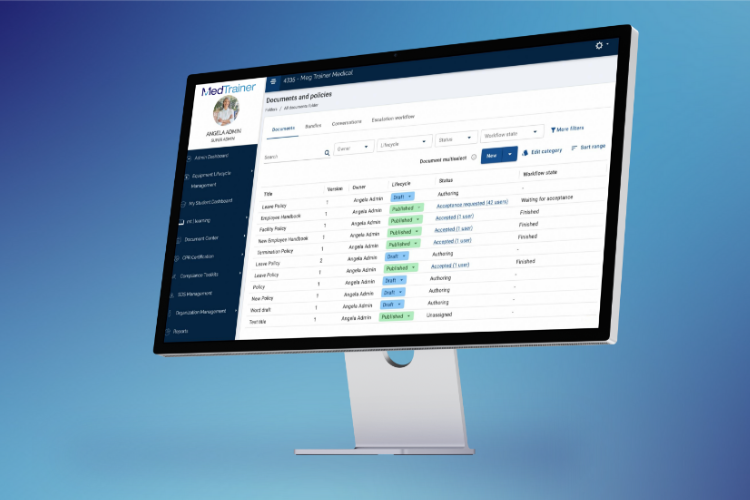Medicare fraud has been a persistent problem in the healthcare industry, leading to millions of dollars in improper spending each year. Thankfully, implementing an effective compliance program can help prevent Medicare fraud and ensure that the healthcare industry remains secure and trustworthy.
The Social Security Act and Centers for Medicare and Medicaid Services (CMS) regulations require all healthcare providers who supply Medicare and Medicaid services to establish and maintain an effective compliance program. This includes measures to prevent, detect, and correct any non-compliance with Medicare and Medicaid regulations.
Put simply: the healthcare industry can achieve compliance, but it must provide employees with adequate training and resources to detect fraud.
Types of Medicare Fraud You Can Prevent with Compliance Initiatives
Medicare fraud is a serious issue that costs the government billions of dollars each year, which leads to increased healthcare costs for everyone. Fraudulent activities can take many forms, from billing for unnecessary services to kickbacks and false claims.
Understanding the different types of fraud and how to prevent them is essential for all organizations to ensure that they remain compliant with CMS regulations and provide quality patient care. The most common forms of Medicare and Medicaid fraud are as follows:
- Billing for services or equipment not provided or not medically necessary for the patient’s medical treatment is considered fraud.
- Upcoding is when a provider claims that they performed a more expensive procedure or treatment when a cheaper procedure was done instead.
- Kickbacks are when a healthcare provider receives financial compensation in exchange for referring patients to other healthcare providers or suppliers.
- Phantom billing involves billing for services or equipment never provided, such as a power wheelchair, when a patient only received a regular wheelchair.
- Identity theft is using someone else’s Medicare or Medicaid information to receive medical services or equipment.
- False enrollment includes healthcare providers fabricating their qualifications or services to become enrolled in Medicare or Medicaid.
- Misuse of provider numbers occurs when healthcare providers use the Medicare or Medicaid provider numbers of other healthcare providers without their permission.
Compliance and its Role in Preventing Fraud
In each of the above instances, compliance plays a significant role in preventing instances of fraud. It starts by instilling a culture of transparency and accountability through proper training and accreditation.
From there, process compliance paves the way for catching fraudulent issues — including those that might be the result of an honest mistake. Developing a Code of Conduct within your organization’s documents and policies for staff acknowledgment can help to ensure personnel are all up-to-date on current best practices.
Finally, regular auditing and compliance reporting encourages corrective action before it reaches the point of creating liability. It all starts with an effective compliance program.

Streamline your compliance with MedTrainer
Medicare Compliance Training
One of the ways that healthcare organizations can implement effective Medicare compliance training is through online courses and in-person training sessions. These sessions can cover a wide range of topics related to Medicare fraud, including identifying potential fraud, reporting suspected fraud, and the consequences of engaging in fraudulent activity.
One specific training program designed to help healthcare organizations prevent Medicare fraud is MedTrainer. We developed our MedTrainer courses to provide healthcare professionals with a comprehensive understanding of the various forms of Medicare fraud and the steps they can take to detect and prevent it.
In addition to providing healthcare professionals with the knowledge they need to prevent Medicare fraud, effective compliance training also helps to create a culture of compliance within the organization. By emphasizing the importance of compliance and the role each employee plays in maintaining the integrity of the system, organizations encourage their employees to be vigilant in their efforts to prevent fraud.
Preventing Medicare Fraud with Compliance
An effective compliance program can be implemented via convenient online courses and training. If created correctly, an effective program would consist of steps to detect, correct, and prevent fraud.
Leadership needs to implement the seven core foundations of compliance in their facilities in addition to thorough training of each core requirement:
- Implementing written policies, procedures, and standards of conduct
- Designating a compliance officer and compliance committee
- Conducting practical training and education
- Developing effective lines of communication
- Performing internal monitoring and auditing
- Enforcing standards through well-publicized disciplinary guidelines
- Responding promptly to detected offenses and undertaking corrective action
Where Do We Go From Here?
Compliance plays a crucial role in preventing Medicare fraud in the healthcare industry. Providing employees with adequate training and resources, creating a Code of Conduct, and implementing effective measures to prevent, detect, and correct fraud can significantly reduce fraud instances and ensure healthcare integrity.
To further enhance compliance efforts, healthcare organizations can use tools like MedTrainer’s online courses and resources to help organizations tackle fraud. You can find more detailed information in the CMS toolkit. It provides an in-depth analysis of the measures that your staff can take to prevent fraud and maintain a secure and trustworthy caregiver model.
